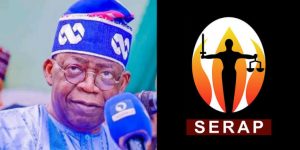The Socio-Economic Rights and Accountability Project (SERAP) has filed a lawsuit against President Bola Tinubu over “the unlawful ban and withdrawal of the accreditations of 25 journalists and media houses from covering the Presidential Villa.”
SaharaReporters recently reported that the Presidency withdrew the accreditations of some 25 journalists from covering activities at the Presidential Villa, Abuja. The affected journalists were simply told at the main gate of the Presidential Villa to submit their accreditation tags.
In the suit numbered FHC/L/CS/1766/23 filed last Friday at the Federal High Court in Lagos, SERAP is seeking “an order to direct and compel President Tinubu to reverse the revocation of the accreditations and ban on 25 journalists and media houses from covering the Presidential Villa”.
The organisation is seeking “an order of perpetual injunction to restrain President Tinubu or any other authority, person or group of persons from arbitrarily and unilaterally revoking the accreditations of any journalists and media houses from covering the Presidential Villa”.
It is asking the court to declare that the “withdrawal and revocation of accreditation tags and ban on the journalists and media houses from covering the Presidential Villa without any lawful justifications is inconsistent with the rights to freedom of expression, access to information, participation, and media freedom”.
“If not reversed, the arbitrary ban on the journalists from covering the Presidential Villa would open the door to other cases of arbitrariness and would restrict people’s right to freedom of expression, access to information, participation, and media freedom,” it argued in the suit.
SERAP is also arguing that the withdrawal of the accreditations of the journalists is “without any lawful justifications,” adding that it is “inconsistent and incompatible with plurality of voices, diversity of voices, non-discrimination, and just demands of a democratic society, as well as the public interest.”
The suit filed on behalf of SERAP by its lawyers Ebun-Olu Adegboruwa, SAN, Kolawole Oluwadare, and Ms Valentina Adegoke, reads in part: “The ban on the journalists from covering the Presidential Villa fails to meet the requirements of legality, necessity, and proportionality.
“The media plays an essential role as a vehicle or instrument for the exercise of freedom of expression and access to information – in its individual and collective aspects – in a democratic society.
“The existence of a free, independent, vigorous, pluralistic, and diverse media is essential for the proper functioning of a democratic society.
“The free circulation of ideas and news is not possible except in the context of a plurality of sources of information and media outlets. The lack of plurality in sources of information is a serious obstacle for the functioning of democracy.
“The exercise of the right to freedom of expression through the media is a guarantee that is fundamental for advancing the collective deliberative process on public and democratic issues.”
“The strengthening of the guarantee of freedom of expression is a precondition for the exercise of other human rights, as well as a precondition to the right to participation to be informed and reasoned.
“Under the Nigerian Constitution 1999 [as amended] and human rights treaties to which Nigeria is a state party, freedom and diversity must be guiding principles in the measures to promote media freedom. The ban on the 25 journalists is entirely inconsistent and incompatible with these principles.”
The accreditation tags of the journalists and media houses were withdrawn on August 18, 2023. They were subsequently prevented from covering activities at the Presidential Villa in Abuja
The affected journalists reportedly include those from Vanguard newspaper; Galaxy TV; Ben TV; MITV; ITV Abuja; PromptNews, ONTV, and Liberty. Other media personnel affected are mostly reporters and cameramen from broadcast, print, and online media outlets.
“Under section 22 of the Nigerian Constitution, the mass media including ‘the press, radio, television and other agencies of the mass media shall at all times be free to uphold the fundamental objectives contained in this Chapter and uphold the responsibility and accountability of the Government to the people.’
“Section 14(2)(c) of the Constitution provides that ‘the participation by the people in their government shall be ensured in accordance with the provisions of this Constitution,’” it said.
No date has been fixed for the hearing of the suit.
 DailyrecordNg …Nigeria's hottest news blog
DailyrecordNg …Nigeria's hottest news blog









